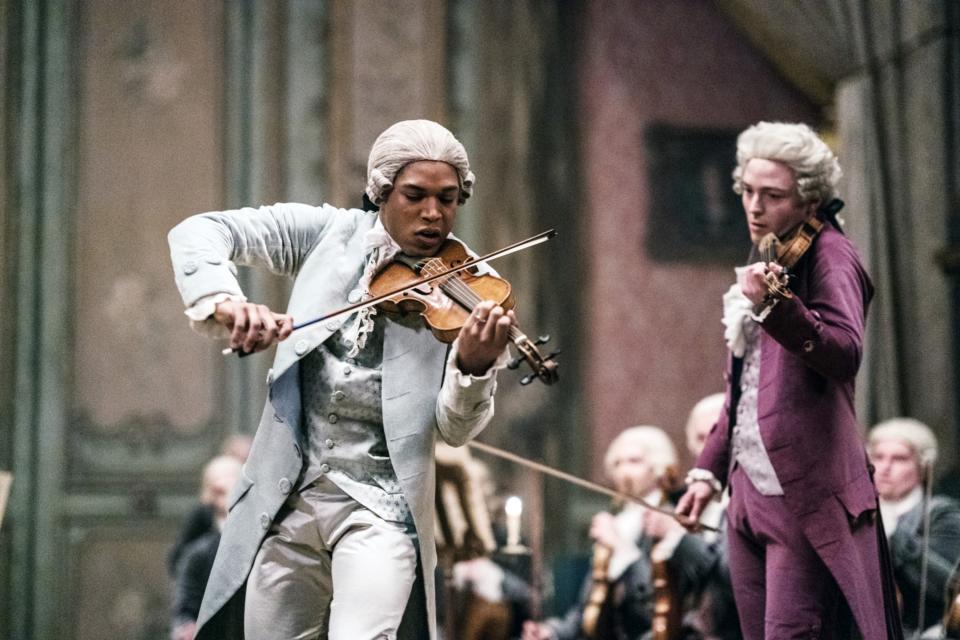‘Chevalier’ Breathes New Life Into the Music of the ‘Black Mozart’
“Chevalier” opens with an electrifying violin battle between two musicians. One of them is Mozart, the subject of several movies, most famously Milos Forman’s Oscar-winning “Amadeus.” As the scene progresses, however, it becomes clear that — much like that previous film — “Chevalier” will belong not to Mozart but to his musical sparring partner, Joseph Bologne, Chevalier de Saint-Georges (Kelvin Harrison Jr.).
Bologne’s story is so incredible that it’s hard to believe no one has made a major film about it before. The son of a French plantation owner and an African slave born in 1745, he was a celebrated violinist and composed symphonies, operas, and string quartets — as well as serving as confidante to Marie Antoinette. Then, the man President John Adams once described as “the most accomplished man in Europe” drifted into obscurity while his white counterparts became world-famous figures.
More from IndieWire
Appropriately, given Bologne’s historical importance, director Stephen Williams called upon two of America’s finest film composers to interpret his music and score his story. Michael Abels, whose score for “Nope” was chosen by IndieWire as one of the best of last year, was responsible for all of the on-screen performances, which meant that he created the orchestrations for Bologne’s pre-existing music. Kris Bowers, who IndieWire described as “versatile and timeless” in an “Influencer” profile, handled scoring duties, creating off-camera music complementary Bologne’s compositions while adding a new dimension to the film’s soundtrack.
Both Abels and Bowers were excited by the opportunity to take a deep dive into Bologne’s life and work. “I remember when I first heard of him because it was a kind of revelation to me that he existed and wrote what he did,” Abels told IndieWire. For Bowers, an article describing Bologne as “the black Mozart” first alerted him to the composer’s significance. “I read that before I came on to this project, then when I started work on this I really got to dive into his work and know it on an intimate level,” Bowers said. Bowers quickly realized that Bologne had a bold confidence that he wanted the score to reflect. “It was really about trying to create a score that was modern and represented Joseph relative to the times he was living in. It needed palpable energy and urgency, but we had to balance that with making sure it still felt rooted in Joseph’s music and what Michael had done.”


©Searchlight Pictures/Courtesy Everett Collection
Abels tried to strike a similar balance in onscreen performances like that opening violin duel, which needed to crackle with an immediacy that would convey the impact Bologne had in his time. “It was very important that the music be legitimate to Joseph and the period, but also that it displayed his swagger in a way that would play to a modern audience,” Abels said. “We were very aware of both what Joseph’s music was and what the story needed to help us understand who he was as a man.”
For the violin battle, Abels wrote original music since whatever Bologne might have been played wouldn’t have been written down; for other sequences, like a montage relating to Bologne’s opera “Ernestine,” Abels stayed faithful to the composer’s original work while rearranging it slightly in ways that worked for the movie. Whenever writing original music, Abels looked to Bologne as a guide. “The good news is that while some of his music is lost, there is still a body of work that is recorded, and it gives a good indication of what his tendencies were as a composer.”
Bowers studied those tendencies closely while composing his score, examining Bologne’s riffs in his solo violin work and his string writing to find the continuities. “I used that as a launch pad to write themes that are very much inspired by his music,” Bowers said. “Then once those themes were established, it became about limiting my instrumentation to things that were traditional to the period but finding ways to mess with them. There are no synths in the score, but it sounds very treated because we detuned and stretched a lot of string pads, or there’s violin and cello writing that’s been detuned to have a lower quality.” Bowers also drummed on instruments like the harpsichord to treat them like percussive instruments and took reverb from solo violin performances and used it as a pad for texture. All of this adds up to a score that feels fresh and contemporary without cheating what could have been done in Bologne’s era.
This was a guiding principle for Abels as well. “It was important that all the music could be played live,” he said. “So we weren’t using processes that couldn’t have been found in 1775. Sometimes we might add a couple of instruments to give a little bit of extra power to a phrase, but primarily this was about displaying Joseph’s music and telling his story and making sure that it was cinematically valid.”
For Bowers, this celebration of and fidelity to Bologne’s work was key, and he hopes that “Chevalier” is just the beginning of a wider embrace of the composer’s music. “I’m really hopeful that this launches people into a deep dive with his music, and that it doesn’t stop with the film,” he said. “Hopefully it’s just the beginning of people learning more about his incredible talent and body of work.”
Best of IndieWire
Sign up for Indiewire’s Newsletter. For the latest news, follow us on Facebook, Twitter, and Instagram.
Source: News
